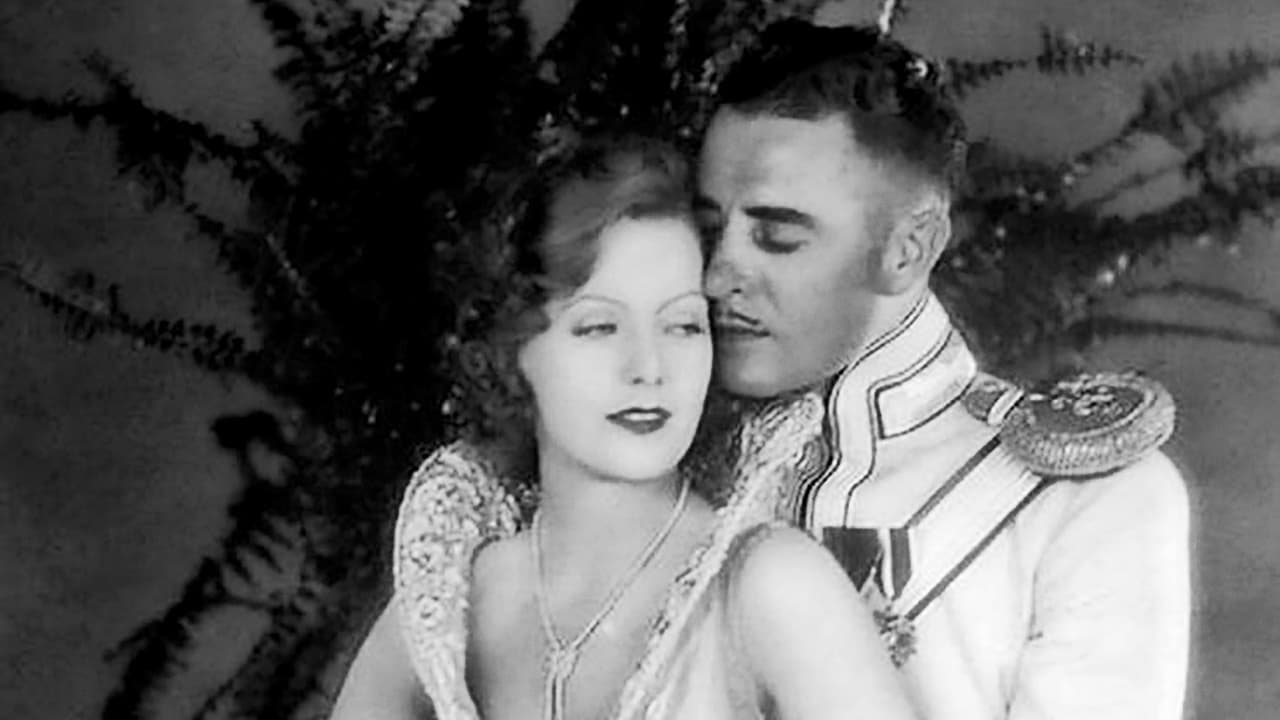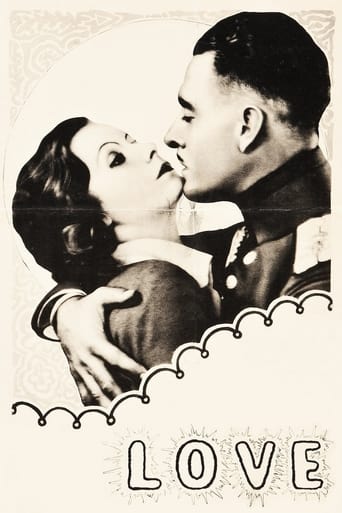Salubfoto
It's an amazing and heartbreaking story.
Nayan Gough
A great movie, one of the best of this year. There was a bit of confusion at one point in the plot, but nothing serious.
Guillelmina
The film's masterful storytelling did its job. The message was clear. No need to overdo.
Janis
One of the most extraordinary films you will see this year. Take that as you want.
evening1
Anyone who thinks silent movies can't convey the realistic passion of love should see this pairing of Garbo and John Gilbert.Their chemistry is palpable and the loss Garbo suffers in terms of her son is believable without plunging into bathos.I was fortunate to see a version of this film on TCM that provided both endings -- the puerile have-your-cake-and-eat-it-too version for American audiences and the bleak, moralistic one that that was distributed for more adult viewers internationally.It's shocking that Americans were believed to require such pabulum. But when you think about it we remain a childish, head-in-the-sand society in many ways. It's just rare to have the us-vs.-them contrast shoved in one's face like this...The performances in this film are stellar. I'm ashamed to say -- and American enough to admit -- that I haven't read "Anna Karenina." Now at least I wish to.I love when movies help to bring my own life into clearer focus. And this one has. Vronsky: "To see you and not touch you...to love you and not have you...No, we'll never see each other again..." This film brings out a terrible truth in life, as acted out by the cold and passionless Karenin. "You two will destroy each other." He needn't have dirtied his hands or mussed his hair and he knew it. Powerful!
mukava991
LOVE is the perfect title for this hacked-down adaptation of Tolstoy's mammoth novel ANNA KARENINA. It was made to cash in on the popularity of Greta Garbo and John Gilbert, fresh from their box office triumph in FLESH AND THE DEVIL earlier the same year. Like virtually all of Garbo's silent films, much of the screen time is devoted to watching the great tormented Swede abandon herself to love, suffer for love, contemplate love, lose love, die. It is interesting to compare this version of the novel with the one made eight years later in which Garbo played opposite Fredric March who, while less dashing and handsome than Gilbert, did give a fine performance as the impetuous and essentially cruel Count Vronsky. In the latter film Garbo is less attractive due to the clash between the curly coiffure she is given and the strong planes and features of her face. She even looks like a male in drag in some scenes. But in LOVE she is beautiful and feminine throughout. The clinging 1920's-style dresses help, even if they detract from the authenticity of a story that is supposed to be set in 1870's Russia. Gilbert was one of the best actors of his era and the talent shows here. He is also a magnetic screen presence and one can understand why audiences in 1927 flocked to see these two together. The scenes of mother-son tenderness between Garbo and Philippe deLacy do indeed seem incestuous as others have pointed out, but so do the scenes between Garbo and Freddie Bartholomew in the 1935 version. I think it was just Garbo's way of expressing love on screen; you see her perform the same kind of nuzzling in other movies, whether the attentions are being given to a man, a woman or a child. I disliked both endings, but at least Garbo was ravishing in the happy one. And remember, Garbo was just shy of 22 when she filmed this, yet she is believable as an older woman. She had a face that could express any age. This movie cries out for a re-scoring. The print shown on TCM is marred by what sounds like muffled applause from time to time.
arneblaze
With a mix of modern dresses for the ladies and typical regimental outfits for the men, this adaptation of ANNA KARENINA is quite different from the novel and other film versions in a few ways. After deserting her family for Vronsky, he does not tire of and desert her - he stays faithful - it is she who voluntarily gives him up to prevent his being thrown out of the Guards and thereby saves his name from disgrace - her suicide is to save him, rather than being an act of despair.Anna's completely "losing it" when his horse falls in a race - in front of society - is her downfall as it exposes their affair to the world, after which society must wreak its revenge. Without this "flaw," things might have gone otherwise for her. The finest scenes are between Garbo and Philippe de Lacy, who plays her son. Their two scenes are so full of playful mother-son love as to prove to better than Garbo's scenes with Gilbert. Indeed, there is none of the passion or obsession here that the two displayed earlier that year in FLESH AND THE DEVIL. de Lacy is a beautiful young actor and a "natural." One of the annoying things about Vronsky is his inability to understand this love - he selfishly wants Anna all to himself - the cad!Garbo's farewell scene with Gilbert, she knowing she'll never see him again and he oblivious to this fact, is also quite well done.The TCM print is flawed by having a live audience reacting poorly on the soundtrack, although the newly commissioned score by Arnold Brostoff is quite fine. This soundtrack addition occurred in 1994 and seems the only one accompanying prints of the film currently. There is a beautifully photographed waltz with Garbo and Gilbert - oft seen in compilations and reminiscent of his waltz scenes with Mae Murray in THE MERRY WIDOW.All in all, worth catching for Garbo, but the two later remakes of the work are much better.
michael.e.barrett
(Possible SPOILERS) I'm glad to see this forgotten film receiving praise here from fans; I echo Silntfan's sentiments about Gilbert--this is the movie that made me suddenly realize he was a good actor. He didn't seem like the same actor from "Flesh and the Devil" and "A Woman of Affairs." My favorite silent Garbo film is still the light, stylish "The Kiss," but "Love" impressed me greatly.By the way, various sources (Maltin's book, the TCM host) claim this 1927 version is "modern". Yet it's set in Czarist Russia, which is not modern for 1927! In fact, nothing in the film indicates it's not a 19th Century setting--they don't drive cars, they don't go to movies, they don't have telephones, etc. You might argue that Garbo's fashions are modern, but that just means they're anachronistic for the Czarist era, not that the whole setting is modern. What's really modern is the ending, and that's what I want to praise.It came as a breathtaking shock to me, since I had no prior knowledge of it. The TCM print ends with a happy resolution. Then we see a notice that this was the American ending, and next comes the tragic ending shown in Europe. This film's tragic ending of Anna K (well-known) is abrupt and unconvincing (unlike every other scene in this film, so well-directed by Edmund Goulding).At the risk of being a literary heretic, I must say the happy ending is better! I know we're supposed to sneer at Hollywood's desecration of great literature, and we're supposed to be swept up in the romantic tragedy of sacrifice, how noble or self-pitying it is. But frankly, the classic ending is a revolt against reason. In fact, it's a conventional moralistic punishment for a supposedly strong heroine. The happy ending, in which people actually behave with sense, is subversive because Anna gets to have her adulterous beefcake and eat it too. Call it a crass commercial decision if you will, but it's exactly what Tolstoy couldn't have published in the 19th Century, and what Hollywood couldn't have done after the Production Code crackdown in 1934--which is probably as much why the 1935 remake is tragic as any special allegiance to Tolstoy. The high 20s was the right window to tell the story sensibly.

